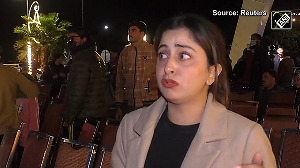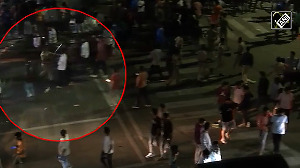A recent study on film piracy conducted by the Rand Corporation confirms what India has been saying for long about Dawood Ibrahim, an underworld don who is currently on the wanted list by the Interpol. The Rand study says that Ibrahim is one of the examples exemplifying the links between crime and terror around the globe.
'The case of Dawood Ibrahim, India's godfather of criminal gangs from Bangkok to Dubai, demonstrates the blurring line between crime and terror around the globe,' the study said. The study noted that in his early years, Ibrahim's gang, D-Company, pursued the standard crime-syndicate practices of extortion, smuggling, and contract killings. 'However, Ibrahim and his cohorts have been able to vertically integrate D-company throughout the Indian film and pirate industry, forging a clear pirate monopoly over competitors and launching a racket to control the master copies of pirated Bollywood and Hollywood films,' it said.
'In 1993, D-Company was transformed into a terrorist organization when it carried out the 'Black Friday' Mumbai bombings, an attack that killed more than 257 people and injured an estimated 713.79 Later, D-Company developed ties to al Qaeda and the Kashmiri terrorist group, Lakshar-e-Taiyiba while its leaders were exiled in Pakistan, 'it said.
'For all these reasons, in 2003, the US Treasury Department Office of Foreign Assets Control added Ibrahim to its terrorist watch list and froze his assets. Shortly thereafter, the United Nations Security Council's al Qaeda and Taliban Sanctions Committee issued a similar order.
'This case demonstrates how an existing organized crime group that turned into a terrorist group leveraged rackets in the film industry to vertically expand into piracy. While there are no estimates of D-Company's proceeds from film piracy, the size and sophistication of Ibrahim's counterfeit DVD operation bespeak a highly profitable enterprise,' the report said.
The report, prepared by Greg Treverton, the lead author and director of the Center for Global Risk and Security at RAND, a nonprofit research organization, said that given the enormous profit margins, it is no surprise that organized crime has moved into film piracy. 'The profits are high and penalties for being caught are relatively low,' he said.
RAND researchers found no evidence that terrorists are widely involved with film piracy, but they outlined three cases where film piracy supported terror groups and warned that such connections could grow in the future.
'If you buy pirated DVDs, there is a good chance that at least part of the money will go to organized crime and those proceeds fund more-dangerous criminal activities, possibly terrorism,' Treverton said.
The report said that while the Northern Ireland terrorist groups aged into pure criminality, this (Ibrahim's) case illustrates the crossing of the line in the opposite direction, as D-Company transformed into an organization not just passively supporting terrorists, but with close links to them,' it said.
'Indian authorities had been aware of D-Company's film piracy operations in Pakistan since the 1990s but were practically powerless to intervene. Only after 2005, when US Customs seized a large shipment of SADAF-brand counterfeit discs in Virginia, did Pakistani authorities, under a threat of trade sanctions, begin raiding D-Company's duplicating facilities in Karachi, it said.






 © 2025
© 2025